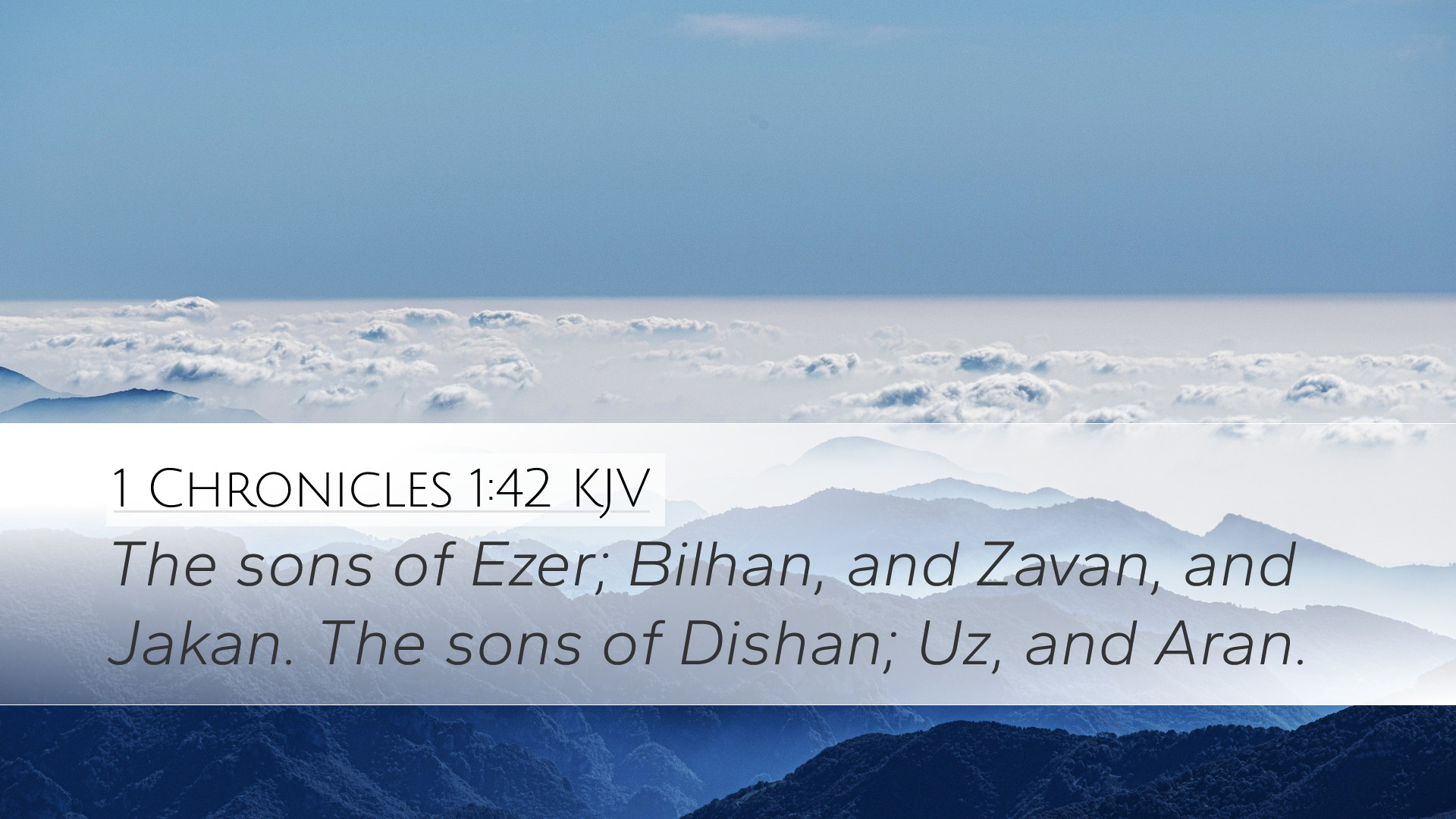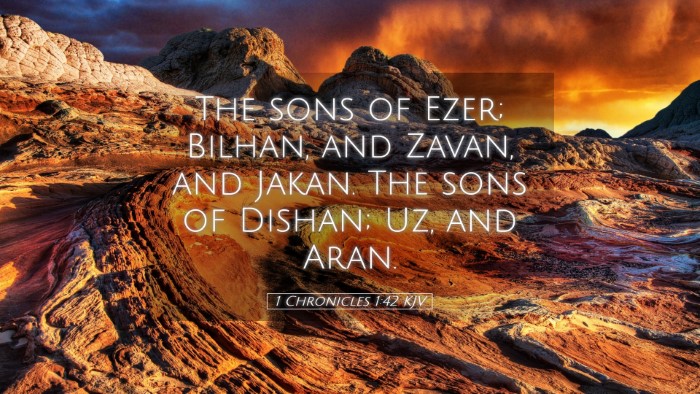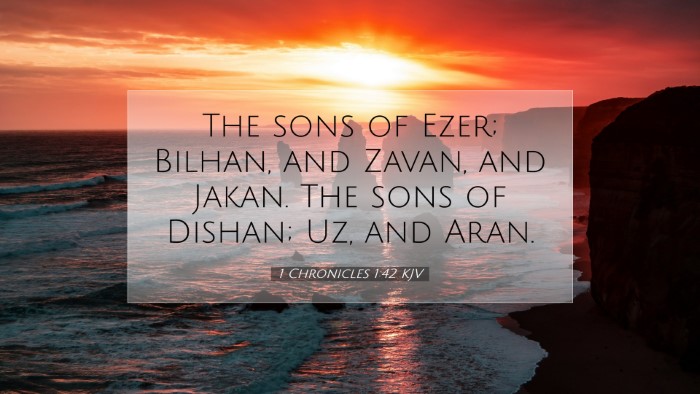Commentary on 1 Chronicles 1:42
Verse Context: 1 Chronicles 1:42 states, "The sons of Esau were Eliphaz, Reuel, and Jeush, and Jalam, and Korah." This verse briefly lists the descendants of Esau, who is a significant figure in the line of biblical history. Understanding this lineage is crucial for contextualizing the narrative of both Esau and Israel, as well as the broader implications for the tribes of Edom.
General Overview
1 Chronicles serves as a historical record, emphasizing the importance of lineage and genealogies in the nation of Israel. This verse, in particular, highlights the sons of Esau, shedding light on Edom's ancestry and its subsequent history.
Insights from Commentaries
Matthew Henry's Commentary
Matthew Henry focuses on the implications of Esau’s descendants. He notes that the genealogy underscores God’s sovereignty in choosing Israel over Esau, despite their close kinship. Henry emphasizes that genealogies are not merely lists but reflect the divine plan for salvation history, illustrating how God’s covenant is manifested through chosen lineage.
- Esau's Lineage: Henry illustrates Esau’s familial relations and how they serve to represent nations that descended from him, significantly impacting Israel’s narrative.
- Importance of Names: Each name holds meaning and significance. For example, Eliphaz may signify "God is pure," which may reflect the character and competition between the descendants of Jacob and Esau.
- Redemptive History: Henry posits that these genealogies are part of the larger story of redemption and serve as a precursor to understanding the relationship between Israel and the surrounding nations.
Albert Barnes' Commentary
Barnes elaborates on the socio-political implications of the Edomite lineage. He notes that Esau is often associated with conflict against Israel, reflecting the ongoing tension between these two groups. His commentary addresses the historical backdrop of Edom and its significance to the nation of Israel.
- Symbol of Conflict: Barnes suggests that the lineage of Esau, beginning here, serves to remind the Israelites of the longstanding enmity that exists between them and the Edomites.
- Historical Framework: He provides historical insights into the relationships, suggesting that the records were crucial during the post-exilic period when identity was being redefined for the community returning to Judah.
- Spiritual Lessons: Barnes draws a parallel between the struggles encountered by these nations and the spiritual challenges faced by believers today, emphasizing the need for reconciliation and understanding amidst conflict.
Adam Clarke's Commentary
In Clarke's analysis, he delves into the individual names mentioned in 1 Chronicles 1:42, providing etymological insights and connecting them to historical narratives. Clarke provides a very detailed examination of Esau’s sons and their eventual fates, highlighting how this genealogical information serves to inform the reader about the unfolding of God’s covenant through successive generations.
- Eliphaz, Reuel, Jeush, Jalam, Korah: Clarke outlines each name, exploring different interpretations and how they fit into the overall narrative, both within the context of Edom and its relation to Israel.
- Theological Implications: He emphasizes the significance of understanding one’s heritage and relationship to God, pointing out that even those outside of Israel (like Esau) can play crucial roles in God’s plan.
- Genealogies as Theology: Clarke argues that these genealogies not only serve historical purposes but also reveal truths about God’s ongoing work through history, emphasizing that the Bible is as much about individuals and their stories as it is about the collective narrative.
Theological Reflections
This verse teaches significant theological principles for pastors, students, and scholars:
- Divine Sovereignty: The lineage of Esau, though distinct from Israel, reveals God’s control over history and His purposes in election and covenant.
- Identity and Heritage: Understanding genealogies helps Christians recognize their spiritual heritage and identity in Christ, affirming the value of every story and lineage in God’s plan.
- Conflict and Redemption: The ongoing struggles illustrated by the relationships between Israel and Edom serve as metaphors for the internal and external conflicts faced by the Church and call for reconciliation.
- Importance of History: This verse invites a closer examination of how historical narratives shape our understanding of God’s character and actions throughout time, challenging believers to reflect on their own individual and communal stories in light of Scripture.
Conclusion
1 Chronicles 1:42 is a rich verse that, while seemingly straightforward in its listing of names, evokes deep theological and historical reflection. Commentaries from Matthew Henry, Albert Barnes, and Adam Clarke serve to unpack the profound implications of these genealogies for understanding both the narrative of Scripture and the overarching message of redemption. For pastors and scholars, the careful study of such seemingly minor verses reminds us that every part of Scripture can shed light on God's expansive and sovereign role in human history and offers pathways for deeper faith and understanding.


